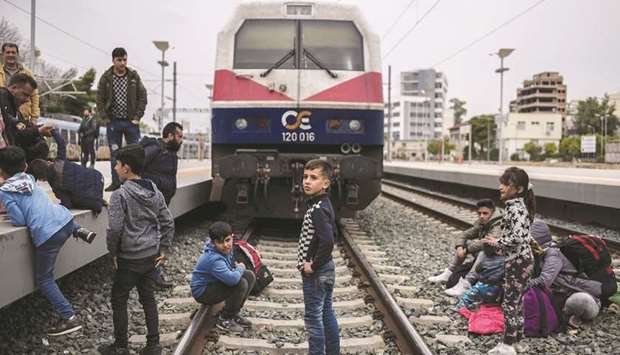Asylum-seekers ended their occupation yesterday of the main Athens railway station as a protest demanding access to the border and passage to other EU states picked up steam in northern Greece.
Around 2,000 migrants housed in camps elsewhere in the country have gathered outside the migrant camp of Diavata near Thessaloniki, where minor clashes broke out on Thursday and yesterday, when police prevented them from heading towards the border with North Macedonia.
After spending the night in the fields outside Diavata, the migrants – among them families with small children in tow – tried to force the police cordon.
Security forces formed a shield wall and made sporadic use of tear gas and stun grenades to keep them from advancing.
TV footage showed shrubs burning nearby.
Authorities said the incidents in Athens and Diavata was sparked by anonymous social media posts over recent days, claiming that human rights groups stood ready to assist migrants in crossing into North Macedonia and on to other EU states.
Both the government and the UN refugee agency have stressed that no such possibility exists.
The UN refugee agency UNHCR has warned the people not to trust the information spreading on the Internet.
In Athens, around 200 migrants had earlier occupied the Larissis central train station, shouting “Saloniki” (Thessaloniki) and “Germany”, an AFP reporter at the station said.
The migrants had bought tickets to Thessaloniki, intending to also travel to the Diavata camp before the authorities realised the plan and halted the train.
Some set up tents on the platform as children ran about.
“We want to go to Thessaloniki and then to the borders,” said Amin Omar, a 27-year-old Iraqi Kurd sitting on the tracks. “We don’t know if they are open.”
After the occupation shut down train services to the north of the country, migration ministry officials persuaded the migrants to end the protest and coaches were sent to take them back to their camps.
Greece’s Migration Minister Dimitris Vitsas said smugglers were behind a “misinformation” campaign.
“For some reason, smugglers are claiming that the borders will open. The borders are not going to open,” Vitsas told state agency ANA.
North Macedonia’s interior minister said Skopje had reinforced its border security as a precaution.
“We don’t expect any trouble. But we reinforced the security on the border because it is our obligation,” Oliver Spasovski told AFP.
Another senior Greek migration ministry official said the demonstration was intended as a “message” to the European Union.
“It’s a message that Europe must understand that this is a problem demanding a European solution,” Miltiadis Klapas, general secretary of the migration ministry, told reporters at the train station.
“But it cannot be imposed like this,” he added, referring to the station shutdown.
More than 70,000 refugees and migrants are believed to live in Greece in the wake of a mass influx beginning in 2015, mainly fuelled by the Syrian civil war.
Most have submitted requests for asylum, clogging an already overburdened application system and further exacerbating approval delays that can stretch into years.
In 2016, a sprawling tent city formed at the border town of Idomeni, a bottleneck where 8,000 people mainly from Syria, Iraq and Afghanistan were stranded after other EU countries began shutting their borders.
The improvised camp was eventually cleared by Greek authorities and the migrants and refugees were relocated to organised facilities around the country.

Migrant children stand on the rails to block the line during a protest at Larissis railway central station in Athens.
